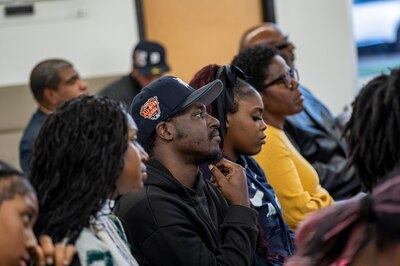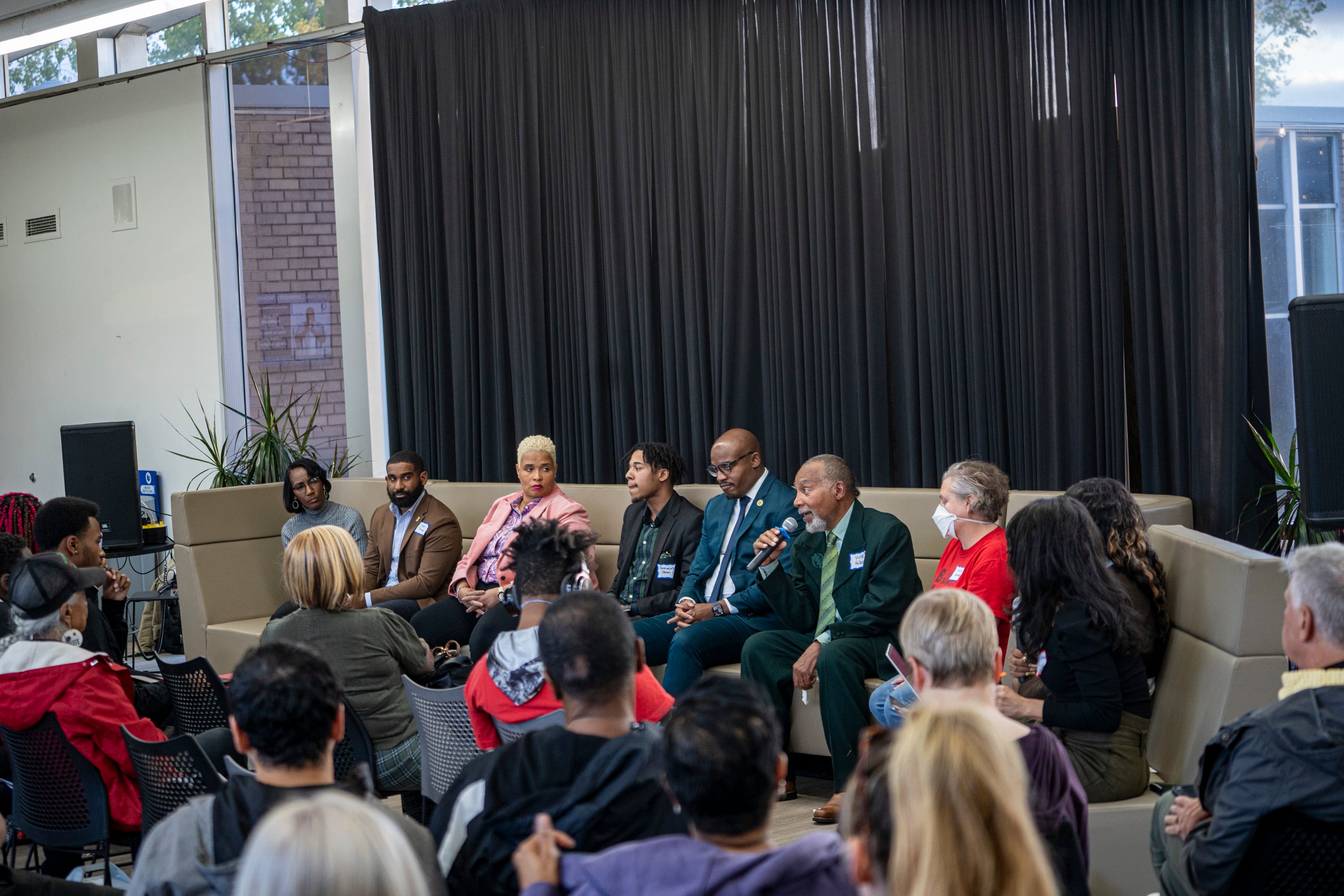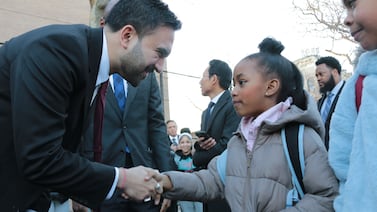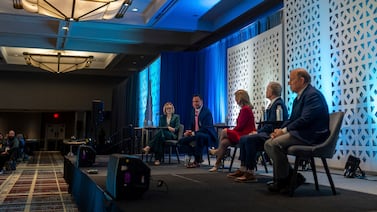Sign up for Chalkbeat Detroit’s free daily newsletter to keep up with the city’s public school system and Michigan education policy.
At a recent Detroit school board candidate forum, there was plenty of agreement on the district’s role in improving attendance but little on how to reduce chronic absenteeism and what role the community can play.
Chalkbeat and its media partners held the forum Tuesday at the Eastside Community Network to give residents a chance to hear from the candidates who want one of three four-year seats on the board. Of the 22 candidates whose names appear on the ballot (one of them, Jason Malone, has said an injury now prevents him from running), 15 participated in the forum.
Most of the questions were centered around chronic absenteeism, a critical barrier to success for so many Detroit students. In the Detroit Public Schools Community District, 65.8% were chronically absent during the 2023-24 school year. That’s down from nearly 80% two years before, but even with the improvement, nearly two-thirds of students are missing too much school.
Students are identified as chronically absent when they miss 10% — or 18 days — in a typical 180-day school year. Statewide, chronic absenteeism is a problem, with about 30% of students missing 18 or more days during the last school year.
Last week’s candidate forum was co-sponsored with BridgeDetroit, Detroit Documenters, Outlier Media, Detroit Free Press, and WDET. Reporters Robyn Vincent (formerly of Chalkbeat) and Sascha Raiyn from WDET moderated along with Cass Tech High School student Autumn Jackson-Hines and recent Cody High School graduate Shantinette Lowe. The student culinary arts program at Golightly Technical Center catered the event, providing boxed meals for attendees.
Here’s what we heard from the candidates (and for more information on the candidates, check out our voter guide):
(Scroll down for audio recordings of the event.)
Why aren’t students coming to school?
Candidates seemed to have a clear understanding of the reasons students are chronically absent. Researchers have consistently found that poverty and its many effects are at the root of the problem. About 80% of DPSCD students come from low-income homes, and recent research found that more district student families live in deep poverty than those attending charter schools in the city.
“If the water in the homes is not on, it’s very embarrassing to go to school if you can’t take a bath or shower,” said Ida Short, a community college teacher who formerly served on the board for Detroit Public Schools, the entity that previously ran the city district but now exists to collect tax revenue and pay off debt. “That’s related to poverty.”
Lack of stable housing and transportation were also mentioned.
Toson Knight, division director of prevention and diversion at Wayne County Juvenile Youth Services, said one thing adults learned through a mentoring program he created was that the biggest reason students weren’t making it to school regularly was because they had no way to get there.
“A lot of times, kids do want to go to school, but sometimes their parents don’t have the transportation. Sometimes they’re not in a stable household,” Knight said. “So we need to make sure that we’re putting resources together to ensure that they can get to school on a timely basis and that they actually know what chronic absenteeism is.”
In DPSCD, high school students receive free passes to take public transportation to school via the DDOT. But that comes with its own set of problems. Students often have to travel long distances to attend high school, particularly if they are enrolled in a school outside of their attendance zone. Bus transportation can often be spotty.
High school students told Chalkbeat last year that they often deal with late buses or buses that don’t show up at all. One student attending King High shared that two buses passed him by while he was waiting for a bus to take him 11 miles to school. It was early on a cold morning and he gave up, opting to go home and skip school that day.
Aliya Moore, who is self-employed and is also an education activist, noted that the district received nearly $1.3 billion in federal pandemic relief funds but “spent a very small portion of that enhancing our transportation.
“The district needs to invest more,” Moore said.

Loss of neighborhood schools has hurt students
More than 200 schools have closed in the Detroit school district since 2000, largely due to declining enrollment and financial crises in the DPS district that culminated in a 2016 state initiative that created DPSCD.
“When they closed down the neighborhood schools, they really did Detroit families an injustice,” said Faustine Onwuneme, a real estate agent and owner of a hair braiding salon who recalled growing up in the city and walking to and from school.
The closures are “forcing students to attend schools outside of their neighborhoods,” said Nicole Conaway, an educator who taught for many years in DPSCD before being fired earlier this year because she says a medical condition prevents her from teaching in person. “That makes it a lot more difficult to get there, and that is something we can fix.”
“We used to have walkable schools in our city and a school made a neighborhood. That’s why you moved in the neighborhood, because of the school,” said Richard Clement, a computer consultant. “We need to change the dynamic.”
Parents need to be held accountable
Several candidates were adamant that parents must take accountability for their children being absent from school.
“What I probably am going to say might be quite unpopular, but we need to work with our parents,” said Monique Bryant, a nonprofit executive. “A lot of parents don’t understand that they set the precedent. The child doesn’t tell them when they want to go to school and what time they want to go to what time they want to go to bed.”
Bryant acknowledged that issues of housing, transportation, and other factors play a role.
“But then you ask yourself, some of the students you see that come from those very same conditions, but they’re in school every day of the 10 months out of the school year.”
In an effort to hold parents accountable, Michigan lawmakers put into law a practice in the Michigan Department of Health and Human Services of withholding public assistance from parents whose children are missing too much school.
Michigan also has laws that allow students who’ve consistently missed a lot of school and their parents to be prosecuted through truancy laws.
But experts say such punitive measures are ineffective, in part because they don’t address some of the varied reasons students are missing school. It also creates the impression that a hammer alone, without addressing the causes of chronic absenteeism, will get students back in school.
Accountability needed for local, state leaders
Candidates mostly agreed that the school board and the district administration are responsible for addressing chronic absenteeism. But some say that solutions must come from outside the district.
Ken Snapp, a business owner and special education case manager, advocated for addressing housing, food, jobs, health care, and child care.
“We must hold accountable our elected officials … to afford our children access to these goods.”
Boyd White, a member with the Detroit law firm Dykema, agreed.
“Chronic absenteeism has skyrocketed, but there has not been a corresponding response by the state, by the county, by the city, to help DPSCD. This cannot just be a DPSCD problem,” White said.
Addressing poverty is key, said Victor Gibson, a retired DPSCD teacher.
“If poverty is keeping one segment of the system down, it’s going to take some extra resources to get it back up again. Our children are at a point now where if they fail, they give up. When they give up, it’s hard to pick them up.”
Jeremiah Steen, a philanthropist and youth activist, said that in discussions with teachers, he’s learning that many of them feel “overwhelmed with the amount of services that they have to provide.” A solution, he said, is to rely on local nonprofit organizations. The district needs to make it easier for them to be involved.
“Our nonprofits are the ones that have the solutions and many of them have the capacity.” Too often, he said, they “don’t know how to become a vendor or how to actually come in and provide support.”
Consequences of chronic absenteeism run deep
Sherry Gay-Dagnogo, the lone incumbent, said chronic absenteeism doesn’t just lead to academic loss. Students lose out on becoming socially acclimated, she said.
Students need to be in a setting where they feel welcome, capable, nurtured, and safe. “It’s continued to create an environment where a number of our children now are starting to struggle with behavioral health challenges,” said Gay-Dagnogo, the director of government relations for Team Wellness Center, said.
Sherisse Butler, the senior vice president and executive director of City Year Detroit, offered similar thoughts.
“School is the first place where we learn to socialize, and we have that sense of belonging outside of the home. And so I think there’s also just a sort of destabilizing of the community, not in the sense of criminalization, but like how we come to build relationships with each other,” Butler said.
Others pointed to the potential for students who aren’t going to school regularly to get into trouble, and how their attendance problems, if not fixed, could lead to a “school to prison” pipeline.
“We have to figure out what we can do to keep these kids in school and not in the prisons,” said Christian Johnson, president of the Bagley Community Council.
One way to address the academic loss issue is to “bring education to the students,” said Tabrian Joe, a mail handler.
“We should expand the virtual school,” Joe said.
You can listen to two audio recordings from WDET of the full event. The candidates were split into two panel discussions.
Lori Higgins is the bureau chief for Chalkbeat Detroit. You can reach her at lhiggins@chalkbeat.org.






